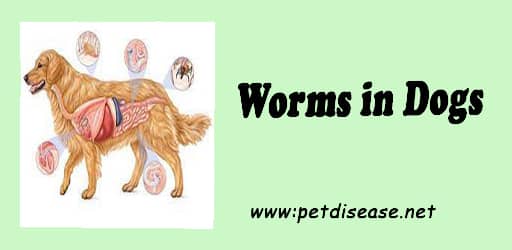Dogs are beloved members of many families, providing companionship, protection, and unconditional love. However, just like humans, dogs are vulnerable to a range of health issues, that includes parasitic infections. One common type of parasitic infection is worms in dogs.
Worms are parasites that reside inside or on the surface of a host organism, such as a dog. There are many categories of worms that can affect dogs, including roundworms, hookworms, tapeworms, and heartworms, among others. These worms can cause a range of health problems in dogs, from mild discomfort to serious illness, and can even be fatal if left untreated.
Symptoms of Worms in Dogs
Worms in dogs can cause a variety of symptoms, ranging from mild discomfort to serious illness. Some dogs may show not a single symptom, while other dogs may exhibit more severe symptoms depending on the category and extent of the worm infection.
Here are some common symptoms of dogs with worms:
Vomiting
Worms can irritate the lining of a dog’s stomach and cause vomiting, especially in younger puppies

Diarrhea when suffering from Worms in Dogs
Dogs with worms may have loose, runny stools or diarrhea.
The stool may also have blood or mucus.
Weight loss when suffering from Worms in Dogs
Worms can cause a dog to lose weight and become weak or lethargic, even if they are eating normally.
Poor coat condition
A dog with worms may have a dull, dry, or scruffy coat due to malnutrition.
Abdominal swelling when worms in dogs
In some cases, worms can cause a dog’s abdomen to appear swollen or distended.
Coughing
Heartworms in dogs can cause coughing, especially during exercise or activity.
Worms in dog poop
Sometimes, a dog with worms may pass worms in their stool, which can be visible to the naked eye.
Anemia when suffering from worms in dogs
Hookworms in dogs and other blood-sucking worms can cause anemia in dogs, which can lead to weakness, fatigue, and pale gums.
Loss of appetite
Worms can make a dog feel full or uncomfortable, which can lead to a loss of appetite.
Lethargy
Dogs with worms may seem less active and energetic than usual and may sleep more often.
Types of Worms

Roundworms
Roundworms in dogs are one of the most commonly found worms that can affect dogs. These worms are long and thin, resembling spaghetti noodles, and can grow up to several inches in length. They live in the dog’s small intestine, where they feed on the nutrients from the dog’s food.
Puppies are especially vulnerable to roundworm infestations, as they can be passed from the mother to her puppies through her milk or during pregnancy. Adult dogs can also contract roundworms through exposure to contaminated soil or feces.
Symptoms of roundworm in dogs can include vomiting, diarrhea, weight loss, poor coat condition, and a pot-bellied appearance due to abdominal swelling. In some cases, dogs with roundworms may also have a cough or difficulty breathing, as the worms can migrate to the lungs.
Tapeworms
Tapeworms in dogs are segmented worms in flat shapes that inhabit the intestines of dogs. They are typically spread through the ingestion of infected fleas, which act as intermediate hosts for the tapeworm larvae.
Treatment for tapeworms in dogs usually involves a deworming medication to kill the parasites. It is also important to treat any fleas that may be present, as they can serve as a source of re-infection.
Hookworms
Hookworms in dogs are another type of parasite that can affect dogs, particularly puppies. They are small, thread-like worms that live in the dog’s intestines and feed on their blood. Hookworms can cause anemia, weight loss, and diarrhea in dogs and can be fatal if left untreated.
Treatment for hookworms in dogs usually involves a deworming medication to kill the parasites. In severe cases, the dog may require additional supportive care, such as blood transfusions or fluid therapy, to help them recover.
Whipworms
Whipworms are another kind of parasite that inhabit the intestines and can affect dogs severely. Whipworms in dogs are small in size and resemble a structure like that of a thread.
Whipworms in dogs are usually caused by ingestion of contaminated soil or feces. Unlike other types of intestinal parasites, whipworms in dogs can be difficult to detect, as they are not able to produce large numbers of eggs and may not always show up on fecal examinations.
Preventing whipworm in dogs can be done through good hygiene practices, such as picking up your dog’s poop and disposing of it properly, as well as keeping your dog on a regular deworming schedule.

Heartworms in Worms in Dogs
Heartworm is an extremely critical and quite fatal disease that is caused because of a parasitic worm scientifically known as Dirofilaria immitis. It is spread by mosquitoes and can affect dogs of all ages and breeds. The heartworms in dogs can grow up to 12 inches long and reside inside the heart and lungs of infected dogs, causing the failure of these organs and leading to respiratory and cardiovascular problems.
Symptoms caused by heartworm in dogs include coughing, difficulty breathing, lethargy, and weight loss. If not treated timely, the disease can be fatal.Treatment for heartworm in dogs usually involves several injections in order to kill the adult worms, as well as medication to kill any immature worms that may be present. It is also important to keep the dog calm and quiet during the treatment period, as physical activity can exacerbate the symptoms of the disease.
How to Diagnose Worms
While tapeworms are identified easily in the dog’s stool as it is visible to the human eye, other intestinal worms must typically be identified through microscopic examination of a stool sample in order to identify the eggs. Your veterinarian will ask you to submit a stool sample in case your dog shows any one of the previously mentioned indications. After the medical tests, the results will be able to confirm the presence of worms in the dog.
Heartworms, on the other hand, are identified using the blood testing method. Radiographs, echocardiography, or even ultrasound may be needed in some occasional situations. According to the American Heartworm Society, many dogs with early-stage heartworm illness exhibit very less or even not a single symptom at all, but if the treatment is started beforehand, the easier it is to cure.

Apart from the prophylactic treatments, your veterinary doctor can also instruct you to try out deworming drugs. These medications are used to cure many intestinal parasite diseases like heartworms. The pups should also go through scheduled stool tests as they are also subjected to intestinal parasites that they could have derived from their mothers.
Dr. Klein, AKC’s chief veterinary officer, suggests that the best course of action for bypassing some serious worm issues in dogs is to prevent them from happening. You can try out flea management methods, conduct routine check-ups and keep a check on the hygiene of your dog.
Conclusion
It is crucial for dog owners to be aware of the symptoms of worms in dogs and to seek veterinary advice promptly if they suspect that their dog may be affected. With early diagnosis and treatment, most worm infestations can be easily treated and controlled. In addition, regular check-ups and preventative care, such as regular fecal examinations and deworming treatments, can help to reduce the risk of future infestations and ensure that dogs stay healthy and happy for years to come.

